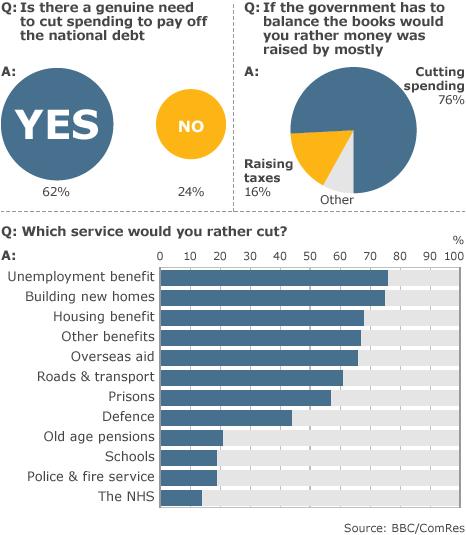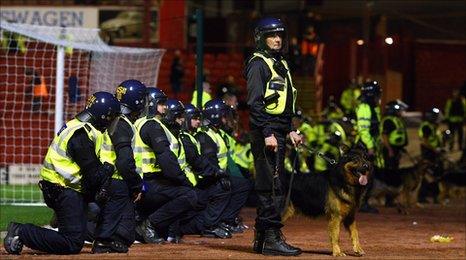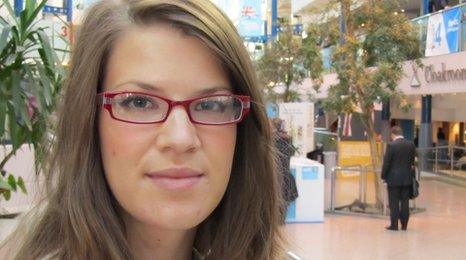Spending cuts: What do they mean?
- Published
The day after the defence review the coalition's going public on how it plans to reduce spending.
It's thought the cuts will add up to more than £80 billion, all aimed at tackling the UK's deficit.
The Prime Minister's already warned tens of thousands of jobs will go.
The government is borrowing £155 billion each year, or £2,500 for every person living in the country.
The coalition thinks now is the time to start clawing some of that money back.
The television licence fee, which funds the BBC, will be frozen at its current price of £145.50 for the next six years as part of the review.
Today (20 October) we get details of exactly how the Chancellor plans to do that.
Large cuts are expected across almost every area of government spending - from the police, to education, to benefits.
We wanted to know how young voters felt about the cuts so we asked the polling company, ComRes, to carry out a survey of 1,000 people between 18 and 24-years-old.
Scroll to the bottom to see a graphic showing the results.
___________________________________________________________
Do we really need to make cuts?
Yes. Or at least that's what our survey suggests.
Sixty-two per cent of those polled felt there was a real need to reduce the amount the government spends, although most wanted cuts to be made slowly to give the economy time to recover.
Tax rises v Spending cuts
Reducing the amount the government borrows each year could mean one of two things.
Either it cuts spending on the services it provides, or it raises taxes.
In fact, the coalition is planning a bit of both: some tax rises combined with spending cuts in most areas.
The 18 to 24-year-olds polled said they favoured cuts instead of tax rises by a large margin: 76% against just 16%.
That kind of attitude is reflected in other parts of the poll.
The plan to increase VAT from 17.5% to 20% was unpopular across the board.
More than three-quarters of 18 to 24-year-olds describing it as a "bad way" to balance the books.
There was, though, support for one tax rise: 73% of those surveyed said putting up the tax on banks' profits was a "good plan".
Protecting services
When asked how the government could claw back some money, the results from the poll were clear: young voters wanted front line services protected.
Eighty-seven per cent said the government should ring fence spending on the NHS, followed by the 82% who said the same for schools and 81% for the police and fire services.
Most young voters also said they would protect spending on old age pensions and the military, although both came much further down the list of priorities.
As for speculation that universities may soon be allowed to charge extra tuition fees?
Two-thirds of young voters didn't like the idea, although it was supported by the other 30% of those surveyed.
Benefits 'could be cut'
So if spending on front line services shouldn't be slashed, where do young voters think the government should save money?
The survey suggests the answer to that question is in the benefits system.
Seventy-six per cent thought jobseeker's allowance could be cut, with more than half of those saying it should be cut "by a lot".
Two-thirds said housing benefits should be reduced.
The majority of young voters supported a weekly limit of £400 on housing payments.
Another nine out of 10 supported medical checks for anyone claiming disability benefits.
Optimism v Pessimism
What does all this mean for jobs and the economy? The survey suggests opinion is split right down the middle.
Thirteen per cent of 18 to 24-year-olds rated their job prospects over the next five years as "great", with women slightly more optimistic than men.
At the same time 17% described their prospects as poor.
People in Scotland, Wales and the West Midlands were the most pessimistic.
___________________________________________________________

ComRes surveyed 1,004 adults aged between 18-24 between 28 September and 3 October 2010.
- Published8 October 2010

- Published6 October 2010

- Published29 September 2010
